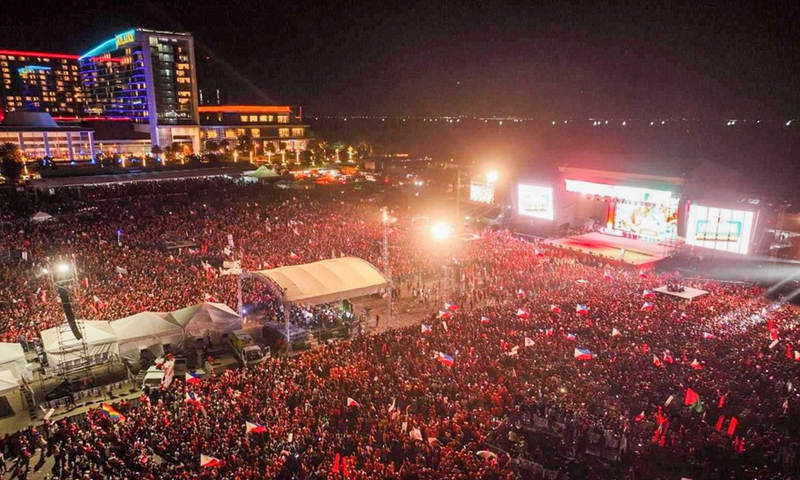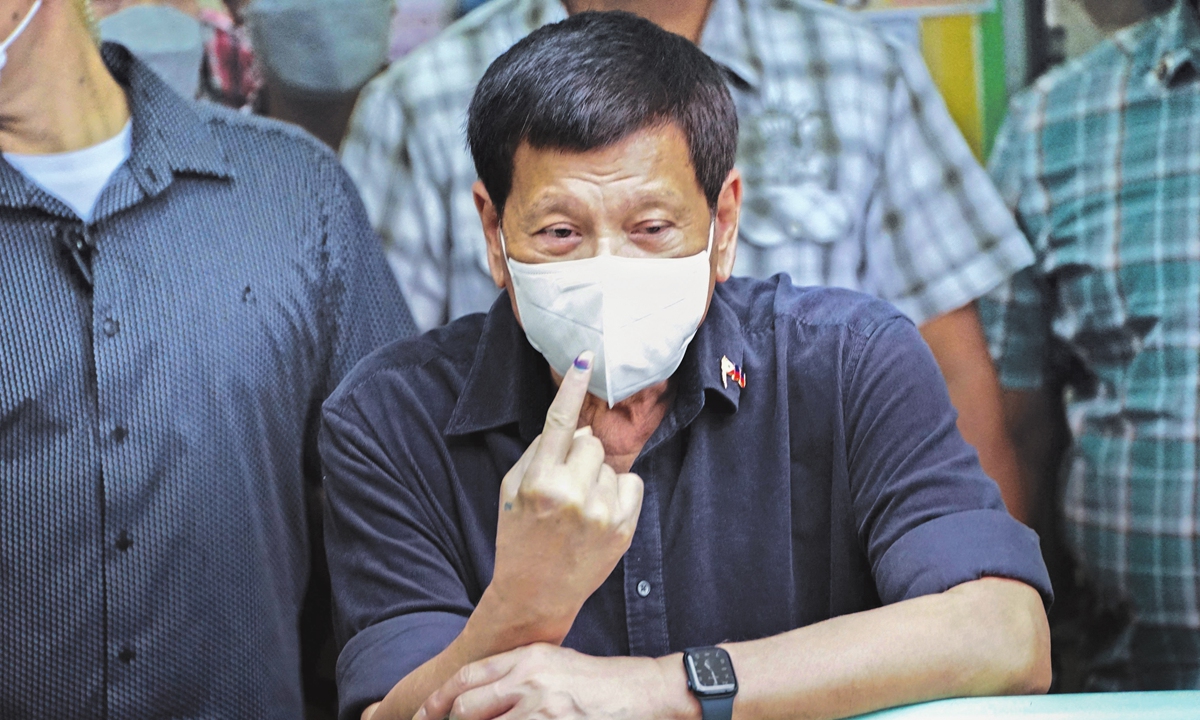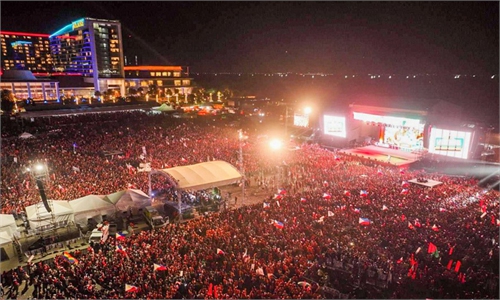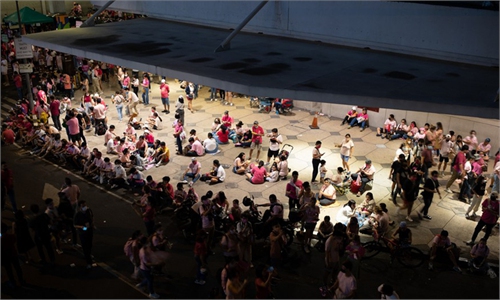Engagement with China ‘to continue’ in post-Duterte era despite US factor
Manila needs to deal with rising pro-US forces and their pressure: expert

Supporters of presidential candidate Ferdinand Marcos Jr. are seen during his final campaign rally for the 2022 national and local elections in Paranaque City, the Philippines, May 7, 2022.Photo:Xinhua
As millions of Philippine voters lined up at polling stations on Monday, the country will either have Vice President Leni Robredo or former senator and congressman Ferdinand Marcos Jr. as their new leader. Observers said that in the post-Duterte era, China-Philippine relations may face some twists and turns amid US interference especially over the South China Sea issue. But any leader with political wisdom would take a mutually beneficial approach in dealing with relations with China.
Some 67.5 million Filipinos aged 18 and over are eligible to vote. Polling stations in the Philippines opened at 6 am and closed at 7pm. Once the polls close, counting gets underway immediately and the candidate with the most votes wins, and the inauguration take place in June, Philippine media reported on Monday.
Marcos, Jr., son of former president Ferdinand Marcos, is the frontrunner. Sara Duterte, daughter of the current president Rodrigo Duterte, is running for vice-president alongside Marcos. His main opponent is Robredo. Celebrated boxer Manny Pacquiao, who is now a senator, is also running with seven other candidates.
Opinion polls suggested Marcos, Jr. remains in the lead although Robredo appears to be closing the gap and analysts said that until the last minute, any result can come out due to the fluid political situation in the Philippines.
Herman Tiu Laurel, founder of Philippine-BRICS Strategic Studies, believes that Marcos, Jr. will win, given his 60 percent preference in all credible and legitimate polls.
But the campaign of Robredo "has done almost everything it can" to erode the overwhelming advantage of Marcos, Jr., including hyping threats of "People Power," the Philippine expert told the Global Times, noting that US media have hyped the criticism of the family of Marcos, Jr., especially his father and called him the "son of a dictator."
Marcos, Sr. was the president of the Philippines from 1965 to 1986. He ruled under martial law from 1972 until 1981 and kept most of his martial law powers until he was deposed in 1986. As one of the most controversial leaders of the 20th century, Marcos' rule was criticized by opponents for "corruption and extravagance."

Philippine President Rodrigo Duterte displays indelible ink on his finger after casting his ballot in the presidential election at a polling precinct in Davao City, on the southern island of Mindanao on May 9, 2022. Photo: VCG
Differ on China issues
The election has drawn considerable attention as the two leading candidates differ on policies especially toward China and the South China Sea, and analysts from the Philippines, China and the US as well as from ASEAN discussed its influence on bilateral relations and the region in the post-Duterte era.
Laurel gave high praise to outgoing President Duterte. Duterte led the Philippines through his six-year term to a very successful and beneficial practice of an "independent foreign policy," particularly on the engagement with China and economic development through trade and infrastructure development.
Laurel told the Global Times that Marcos, Jr. "will definitely continue to engage China in dialogue and negotiations" to arrive at "win-win" solutions.
Duterte has insisted on a pragmatic attitude to keep cooperation with China and properly deal with maritime disputes, and he is also known for maintaining close exchanges with Chinese leaders.
Marcos, Jr., who is known for his pragmatic political views, stressed that he may carry on the policies of Duterte to focus more on domestic affairs, which may attract supporters of his father and Sara Duterte's father, Chen Xiangmiao, an assistant research fellow at the National Institute for South China Sea Studies, told the Global Times.
But Robredo, who is deemed as a pro-US politician, has her own advantages - former Cabinet members and government officials of the late former president Benigno Aquino III backed Robredo and she has earned support as a female candidate, Chen said, noting that the result is hard to predict.
Unlike Robredo, who once claimed to use the Permanent Court of Arbitration ruling as a "weapon" to deal with the sea row with China, during the presidential debate hosted by media in February, Marcos, Jr. said he will push for the crafting of a code of conduct between ASEAN and China to resolve the territorial disputes in the South China Sea.
Some US media noted that a Robredo government would deepen ties with Washington especially when the US is building up an Indo-Pacific framework with the Philippines and ASEAN.
In the post-Duterte era, Philippine leaders need to deal with the rise of pro-US forces and their pressure on the government to take a tough tone toward China, especially on the South China Sea issue.
Aside from rising nationalism, in facing soaring oil prices, the development of oil and gas in the South China Sea may also trigger disputes between China and the Philippines. How the new Philippine government will deal with these tough issues remains unknown, Chen said.
The US has always planned to make the Philippines a major player in its island-chain strategy to contain China. A pro-US government is what the US wants and it has never stopped using intelligence agencies and other organizations to influence some groups in the Philippines and its military, Chen said.
"Marcos is the only son of the former president, who, although a controversial figure that ran a military junta, had always wanted to shake off US control and turned to China to help its country realize socioeconomic development," Sun Xiaoying, a research fellow at the Guangxi Academy of Social Sciences, told the Global Times on Monday.
"Marcos, Jr. knows that the corruption issue during his father's term has long been spoiled by the US, but was later used as a tool to target and attack," Sun said, noting that his father's encounters have left him with contradiction toward the US that is difficult to resolve.
However, Marcos, Jr. is unlikely to be tougher than Duterte amid pressure from the US, but rather, he may go around and use another approach to deal with the US.
On the South China Sea issue, experts said that the key lies in whether China is determined on its stance. As long as China clearly states its principles and draws its red lines, the Philippines would not overturn the issue to a great extent, even with constant interference from the Western world.
"Take the South China Sea Arbitration as an example. Filipino scholars have discussed with us that they know the arbitration has no real legal effect, but with the incessant hype of Western media and extreme pressure from the US, the Philippines has been put in a dilemma," Sun said.
The expert added that the Philippines' role is somehow similar to Ukraine as they both have an important strategic location to the US. "The US and Japan have been 'bombarding' the Southeast Asian country with continuous meddling using disinformation and that has caused a serious impact on the Philippines. Some Filipino scholars told me that what the US has done is neocolonialism, taking control of their politics, economy, and their lifeline," Sun noted.
Chen suggested that in the post-Duterte era, no matter who leads the government, he or she should know the importance of keeping engagement with China, especially on trade since this also fits the interests of the Philippines.
For possible twists and turns on relations and on the South China Sea issue, Chen noted that China should deal with it with greatest sincerity but also prepare for a worse situation. "We seek cooperation on the South China Sea issue and also hope the Philippines meet China half way amid outside forces' interference."



